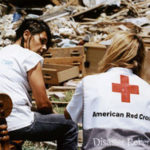May is National Mental Health Month. Started in 1949 by Mental Health America in an effort to raise awareness about mental health conditions and promote mental wellness, Mental Health Month shines a spotlight on the advocacy, education, and services provided by our country’s mental health agencies as well as on the importance of making mental health services available to all citizens.
One of the themes of this year’s Mental Health Month is “Healing Trauma’s Invisible Wounds”. The theme focuses on increasing awareness of the impact traumatic events – including disasters like fires, hurricanes, and tornadoes that devastate the lives of their victims by displacing them from their homes and/or destroying their possessions – have on individuals and families.
 In the aftermath and in an effort to alleviate the impact of a disaster, American Red Cross Disaster Action Team members provide tangible support, in the form of shelter, food, clothing, and medications, to those affected. But sometimes, these necessities are not enough. Not surprisingly, sometimes those who’ve just seen their homes and all of their belongings burned to the ground or washed away by a flood are in need of more than just a place to stay for the night and a warm meal. They need the support of an American Red Cross Disaster Mental Health Worker.
In the aftermath and in an effort to alleviate the impact of a disaster, American Red Cross Disaster Action Team members provide tangible support, in the form of shelter, food, clothing, and medications, to those affected. But sometimes, these necessities are not enough. Not surprisingly, sometimes those who’ve just seen their homes and all of their belongings burned to the ground or washed away by a flood are in need of more than just a place to stay for the night and a warm meal. They need the support of an American Red Cross Disaster Mental Health Worker.
Disaster Mental Health Workers (DMHW) provide emergency and preventive mental health services to those affected by disasters, as well as to Red Cross volunteers and employees involved with disaster relief operations. Initially, DMHW help those with whom they come in contact manage stress and lessen feelings of anxiety; once these emotions are under control, DMHW educate about stressors and their effects, methods of coping, crisis interventions, and available referral services/resources.
There is always a need for Disaster Mental Health Workers, so this month, I urge those of you who are qualified (Disaster Mental Health team members must be licensed/certified as a counselor, therapist, psychiatrist, psychologist, social worker, or psychiatric nurse) to consider joining the ranks of the American Red Cross as a member of your local chapter’s Disaster Mental Health team.
For more information, contact the Volunteer Resources team at your local chapter and ask how you can begin the process to become a member of their Disaster Mental Health team.
